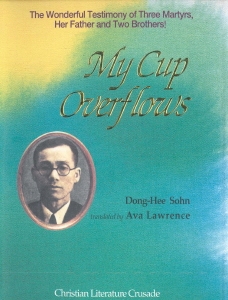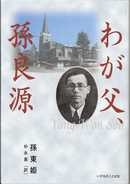 |
On June 3rd, 1902, Sohn Yan-Won was born in Yung-sannam-do province, Korea, to Christian parents. His father, Jong-Il, was a Presbyterian Deacon.
In 1910, Japan annexed Korea and required all Koreans to bow towards the Japanese Emperor as “god-king”. Yan-Won refused to bow at his Elementary School and so his principal beat him. On March 1st, 1919, Koreans demonstrated against Japanese rule. Jong-Il was imprisoned for dissidence. His family became poor. Yan-Won went to work and study in Seoul and Tokyo. After graduating, he evangelized in his home province, married, and became a father. During that time Sohn wrote, “…Even if I were to lose all things but faith, I would be richer than those who have all else. Even if I were to have all things but faith, I would be poorer than those who have nothing.”
In April, 1935, Sohn entered the Pyongyahng Theological Seminary, graduating in 1938. He became the pastor and school principal at Ae-yan-won, a village for sufferers of Hansen’s disease, near Yeosu. There, he continued to rebel. He refused to order his flock to bow at the Shinto shrine the Japanese had put right at his church’s front door.
One Sunday in April 1940 he preached, “…Those individuals and nations which are persecuting the believers will be punished when Jesus Christ comes” and added, “…He will rule over the nations as King of kings and subjugate all the nations, including Japan, under his feet… ”
 |
Japanese informants in the congregation that day had Pastor Sohn arrested and charged with being an enemy of the empire. In January 1941, Sohn was tried in the Gwong-ju District Court. He was sentenced to eighteen months.
One week later, Pastor Sohn commenced his brutal prison sentence. Regularly beaten by the guards, he wrote to Ae-yan-won, “The day follows night and the warm spring follows winter, so he who would see the brightness of day must go through the darkness of the night. If we would greet the spring we must endure the cold winter.” On May 17th, 1943, the police took Sohn to the Seoul “thinkers” prison where unsuccessful efforts were made to break his resolve. During his time in prison, his father Jong-Il died. On May 17th, 1945, Pastor Sohn’s imprisonment ended. Re-united, the remaining Sohn family returned to Ae-yan-won. There, Pastor Sohn helped to lead the Repentance Movement, which dealt with pastors who had yielded to Shinto worship. As he also became a popular speaker, Sohn was often away from home.
In 1941 the Japanese brought America into World War 2. In 1945, America ended the war with Japan. However, three days before Japan would surrender, Soviet troops entered Korea from the north. The Americans, who were also entering Korea, quickly set the 38th parallel as a line the Soviets were not to cross.
On October 20th, 1948, Communist rioters sieged the southern town of Soon-chun. There, they went on a killing spree. On the 21st, Communist sympathizers surrounded the house five of the Sohn children stayed at while attending school. They taunted the eldest, Dohng-In for being a friend of American soldiers. Dohng-In came outside to defend himself. His little brother Dohng-Sin rushed to help, but the youths overpowered them and took them away, bleeding. Run through the streets, the Sohn brothers urged their captors to stop fighting fellow Koreans and to accept Christ, but they didn’t listen. Instead, they shot both Dohng-In and Dohng-Sin. The brothers died calling on the name of Jesus.
The Communist uprising in Soonchun lasted less than a week. Government soldiers were rushed to the town. One of those arrested was Chai-Sun, a friend of the Sohn brothers, who had now been accused of killing them over ideological differences. The news of his sons’ deaths struck Pastor Sohn Yan-Won with grief and pride alike. The funeral service for the brothers was held on the hills above Ae-yan-won.
Afterwards, Pastor Sohn sent word to Soon-chun that he did not want the murderer executed. Rather, he wanted to adopt him and teach him about Christ. After Chai-Sun confessed to the murders, the officer released him for adoption. The news of how Pastor Sohn had forgiven and adopted Chai-Sun spread through Korea. Pastor Sohn devoted himself to teaching Chai-Sun, and the young man quickly became a Christian. Within two years he was a student in the Bible Institute of Korea, after which he became a minister.
On June 25th, 1950, Pastor Sohn went to the port of SaM-Chunnpo, from where he planned to embark for meetings in Busan. On that same day the 38th parallel had been ruptured by a Communist invasion from the north, which had surged towards Seoul despite the UN-called ceasefire.
The Korean war had begun, and if Communism was victorious, the South would lose its freedoms. Wanting to prepare the church, Pastor Sohn remained in SaM-Chunnpo for two weeks and held religious meetings. When Pastor Sohn returned to Ae-yan-won on July 7th, he found the patients concerned. They warned him to flee Yo-su before the Communists arrived. As a Christian pastor, his life would be in danger. Pastor Sohn refused. A few days later, Chai-Sun visited Pastor Sohn and urged him to go to Busan. He declined.
In July, 1950 northern troops arrived in Yo-su and began taking over the town. In late July, 1950, Ae-yan-won held an emergency board meeting to decide on a course of action. Pastor Sohn had already made his views clear. As Christians they should be prepared to take their stand against Communism, even if it cost them their lives. Few disagreed with him. In the end the board officially sided with the pastor.
In the weeks that followed, the communist People’s Army took jurisdiction over Ae-yan-won. One day Communist police barged into Pastor Sohn’s church and hauled him off to the Yo-su police station.
Once he was there, the police imprisoned him on allegations of being pro-American and anti-Communist. On September 27th, 1950, around 6pm, armed police came and told Pastor Sohn and his fellow prisoners to leave their cells. When they did, guards tied their hands and took them into the auditorium. One of the guards announced that they were going to Soon-chun to be released.
At 10pm the procession set out. On the way, Pastor Sohn shared the Gospel with a guard who was beating him. In time, the guards took the prisoners to an orchard in Mip-yung and systematically shot them all.
The next morning news reached Ae-yan-won. A group of men set out carrying a stretcher. They returned late afternoon carrying the lifeless body of Pastor Sohn. He had died from bullet wounds to his shoulder and both hands.
On the sunny morning of October 13, 1950 the funeral of Pastor Sohn Yan-Won was held. Hundreds came. Leading the procession that followed the coffin was Chai-Sun as eldest son and Chief Mourner. The procession took the body to its final resting place on Dohng-doh Island. Dohng-In and Dohng-Sin were buried there, and Pastor Sohn was buried with them.
"I have been engaging in self-examination during prayer this morning. Am I worthy of being a child of God, a servant of the Lord, a temple of the Holy Spirit? May the Lord grant grace that I may dedicate myself to the glory of God and to his kingdom. May the Lord grant grace To sacrifice my life for my family To sacrifice my life and my family for my church To sacrifice my life, my family and my church for my nation To sacrifice my life, my family, my church and my nation for my Lord.” – Pastor Sohn Yang-Won, Diary, June 1949.
“For whoever desires to save his life will lose it, but whoever loses his life for My sake will save it.” – Luke 9:24 (KJV)
Page created on 4/10/2012 12:00:00 AM
Last edited 4/10/2012 12:00:00 AM
